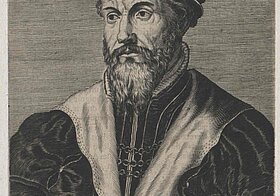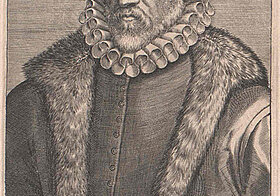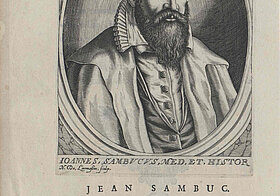Annual maintenance work will take place again this summer, which is why the reading rooms at the Heldenplatz location and in all collections will be closed from Friday, July 25, to Tuesday, August 5, 2025.
Due to the shutdown of the ordering system, no media orders can be accepted from Thursday, July 24, 2025, 4 p.m. to Tuesday, August 5, 2025, 4 p.m. The regular opening hours will then apply again from Wednesday, August 6, 2025.
The study room of the Albertina is closed from July 15 to August 15. During this time (except July 25 to August 5), media ordered from the Albertina collection will be transported twice a week (Monday and Thursday) to the reading rooms of the National Library on Heldenplatz and can be used there.
Starting August 1, 2025, the State Hall will open at 9 a.m.
Due to an event, the State Hall will be closed on August 4, 2025.
In the sixteenth century, several leading scholars were closely affiliated with the court library.
Wolfgang Lazius (1514–1565) was a professor of medicine at the University of Vienna and official historiographer of Emperor Ferdinand I (1531–1564). He visited libraries, monasteries, and archives for the emperor in order to research the dynasty’s history and its countries. From three extensive library tours that took him, among other places, to Admont, Seckau, St. Lambrecht, Friesach, Gurk, St. Paul, Cilli, Carniola, and Further Austria, he returned to Vienna with a substantial haul.
Beginning under the reign of Maximilian I, the importance of the printing press and thus the role of the sciences and of history, genealogy, heraldry, and iconology were increasingly recognised as means to legitimise the claims to sovereignty, consolidate power, and safeguard the imperial legacy. As a result, the idea and function of the library was evolving more and more from holding a treasure to being a place of knowledge and cultural memory. It was no longer the task of books to simply be beautiful and be kept in holy places; all of a sudden, the invisible, the knowledge hidden in them, also gained in importance.
In the latter half of the sixteenth century, the imperial library was considerably enlarged by knowledgeable book collectors: as the emperor’s envoy, the diplomat Augerius Gislenius Busbequius or Ogier Ghiselin de Busbecq (1522–1592) bought valuable Greek manuscripts in Constantinople, more than 270 of which are still documented; more than 560 Greek and Latin manuscripts were acquired in Italy by the collector Johannes Sambucus or János Zsámboky (1531–1584); and the catalogue of Hans Dernschwamm (1494–1568), the administrator of the copper mines leased by the emperor to the Fuggers at Neusohl, lists 651 works purchased for the imperial library in Vienna after his death.



